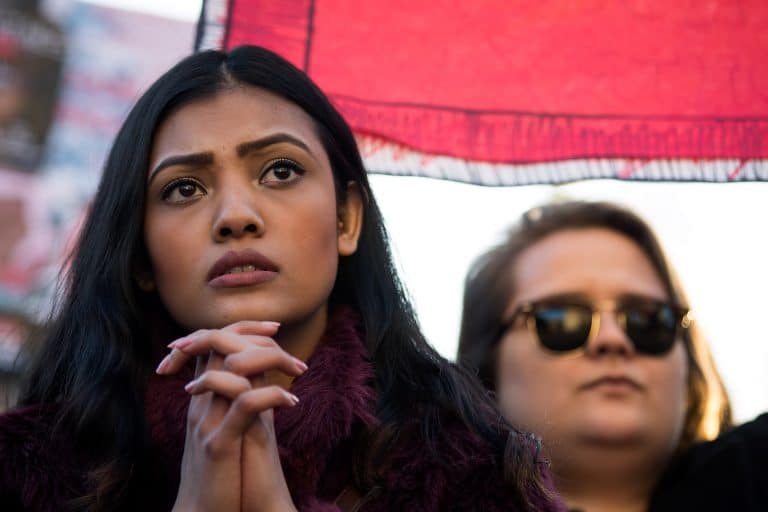
Image by Drew Angerer/Getty Images, © All Rights Reserved.
So Much of the Privileged Life Is About Transcendence
The day after the 2016 presidential election, I happened to be speaking at a conference in New Orleans, one of the bluest cities in the South. While wandering the working art studios in the Bourbon Street area, I encountered a local sculptor who, upon hearing that I teach peace and justice studies at Duke Divinity School, burst into zealous tears. Her collar soggy with snot and runny mascara, she articulated the disillusionment that many New Orleanians felt in the aftermath of the President Trump’s election.
“This is so devastating,” she lamented.
“Is there any hope? Where is God in the midst of this?”
Her sorrow didn’t surprise me; after all, over 80 percent of New Orleans’ voters chose Hillary Clinton. However, her difficulty in finding hope and God in the midst of such devastation is one that struck me as both distinctly human and distinctly privileged.
Indeed, as I’ve traveled the U.S. since the election, I’ve witnessed similar sentiments among privileged people (e.g., white and/or middle-class people). I honor the humanity in their vulnerable and sincere questioning. I also believe it is worth pointing out that privileged people’s immediate and enduring theological responses to the election have been decidedly less hopeful than those of people who identify with oppressed groups. This suggests to me that the difficulty in finding hope and God in the midst of devastation has deep roots in many privileged people’s theology.
The privileged life is all about transcendence, living a life that lies beyond the limits of ordinary experience. It’s about avoiding, escaping, or anesthetizing systemic/societal pain. It is quite effective as a system of transcendence in that most privileged people are deeply disconnected from the ordinary experience of many.
In 2017, a woman of color regularly faces food insecurity, violence, and/or housing instability. This is the norm. Since privileged people have agency and mobility, we can typically choose which neighborhoods we want to live in, which schools to send our children to, and which churches to attend. Most privileged people make choices that shield them from the realities of those who are excluded from such stable, safe, and prosperous communities. Intentionally or not, when privileged people choose to participate in economically- and racially-stratified neighborhoods, schools, and spiritual communities, they isolate themselves from the majority of people in their region who experience systemic oppression.
Given that transcendence is central to the privileged experience, it’s not surprising that many spiritual practices that are common among privileged people support a theology of transcendence, a belief that God lies beyond, not within, the limits of ordinary experience.
I recently attended a silent meditation retreat in which we spent all day alternating between walking and sitting meditation. Over course of the week-long retreat, we concluded our daily meditation practice by watching hundreds of chimney swallows gracefully circle the sky and eventually acrobatically swoop into the retreat center’s brick chimney for rest. The meditation teachers invited us to allow the “liturgy of the chimney swallows to wash over us,” and the act of watching this stunning natural theater was coined the “swallow meditation,” thus designating it a distinctly spiritual activity on par with the walking and sitting meditation that we had done all day.
I absolutely loved the swallow meditation and found it to be deeply edifying. And yet, as the only person of color at the retreat, I wondered whether a focused, curious meditation on the devastating effects of environmental racism in predominantly black and brown neighborhoods would have also been designated a spiritual activity. I’ve never been to a meditation retreat that included a “contaminated water meditation.”
Turning our attention toward systemic pain is not something we typically associate with spiritual nourishment and liberation, but what if it is? What if we can’t truly experience the hope of the Divine until we are able to experience the Divine in the most hopeless situations?
Throughout human history, the oppressed peoples of the world have, out of necessity, intentionally turned their focus on God in the midst of the most painful experiences.
Within the Christian tradition it is taught that Mary conceived of the Magnificat while living in dire circumstances as a Jew under Roman occupation, further endangered by her status as an unmarried pregnant woman of color. In her song, she articulates a theology of immanence, the belief that the God of hope is precisely to be found in the midst of uncertainty and distress.
Mary’s theology of immanence has three parts. First, she affirms that God has graced her particular situation, that God is by her side as she experiences oppression in her “lowly” social location:
“My soul proclaims your greatness, O God,
and my spirit rejoices in you, my savior.
For you have looked with favor
upon your lowly servant,
and from this day forward
all generations will call me blessed.
For you, the Almighty, have done great things for
me, and holy is your Name.”
Second, she affirms that God is a God of justice who works on behalf of the systemically oppressed:
“Your mercy reaches from age to age
for those who fear you.
You have shown strength with your arm;
you have scattered the proud in their conceit;
you have deposed the mighty from their thrones
and raised the lowly to high places.
You have filled the hungry with good things,
while you have sent the rich away empty.”
Finally, she looks to the future with hope, affirming that God is coming to her aid and will fulfill the promises that were made to her ancestors:
“You have come to the aid of Israel your servant,
mindful of your mercy—
the promise you made to our ancestors—
to Sarah and Abraham
and their descendants forever.”
Unlike the privileged life, Mary’s life as a “lowly servant” fell within the limits of ordinary experience. She was unable to transcend the realities of the oppressed women of color of her day. As theologian Grace Ji-sun Kim teaches us, theology is biography. Mary’s theology grew out of her lived experiences of oppression. Her lived experiences required a robust theology that could withstand the pain and disillusionment that she regularly faced. Her understanding of God had to be intimately linked to her pain, so much so that hope and God were found in pain.
What would it look like for privileged Westerners to intentionally turn toward the very pain that we so often avoid, intentionally seeking out evidence that God is present, active, and bringing hope? Because in the end we must ask ourselves: How can we seek hope and God in the midst of devastating systemic pain if our whole lives are about escaping the reality of such pain?

